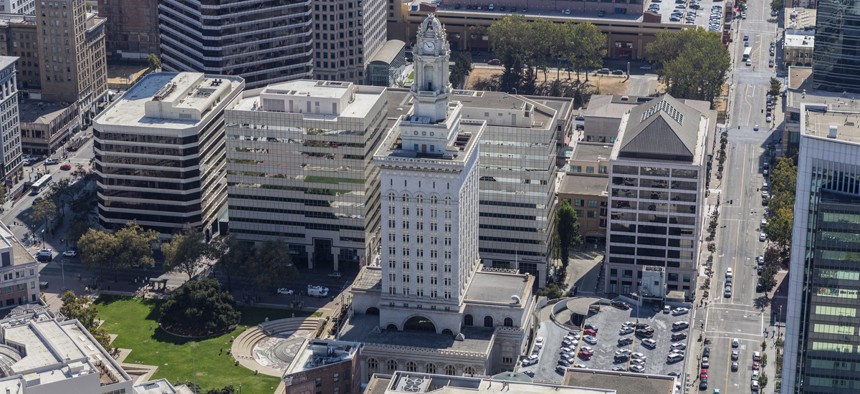‘Government Is What We Do Together That We Can’t Do Alone’

Oakland City Hall Shutterstock
As civic technologists gather for this year’s Code for America Summit, there are some key themes worth repeating.
OAKLAND, Calif. — Some of the brightest minds in civic technology have assembled in the Bay Area for this year’s Code for America Summit. As this year’s gathering gets underway, it’s good to highlight something that's very relevant from a different conference not too long ago.
During a presentation at the Engaging Local Government Leaders annual conference in Golden, Colorado in early May, Jay Anderson, a citizen engagement specialist for the city of Colorado Springs, Colorado, kicked things off with a quote from Jennifer Pahlka, Code for America’s founder and executive director: “Government is what we do together that we can’t do alone.”
It’s something many civic technologists involved in Code for America are familiar with, but is one of those foundation-laying quotations that is worth repeating for those working in city halls and other public-sector organizations. It’s a message that certainly resonates for many working on the frontlines of municipal management, even if it doesn’t always resonate with the public at large that they serve.
That’s where good communication becomes critically important. “The point of engagement is to build trust” with citizens, Anderson said during his presentation. “Build that trust,” he said, or be prepared to “lose it.”
In any local government, good communication with citizens is vitally important, though it’s something that most localities struggle with at some level—not surprisingly, the importance of effective storytelling is a common theme for many organizations working in the local government space. Weak engagement with the public can undermine efforts to solve problems and effectively deal with challenges, Anderson noted: “Does it matter if the problem was solved if they don’t know that a problem was solved?”
Data and technology, of course, can help any public-facing organization, including local governments, effectively communicate the complexities of the challenges they face and the ways to work toward solutions that have lasting impacts and bring continuous improvement to public services.
But don’t think that public engagement is limited to communication. Anderson said: “Citizen engagement is not a communications thing, it’s a process thing.” It’s not just about sending out a community newsletter, utilizing social media and posting a meeting agenda on a website. It’s about building trust at every point where the public interacts with government, whether it’s ensuring that recycling is collected on time or designing a public-facing website, platform or tool so it isn’t mind-boggling for citizens to use.
And that’s where those involved in Code for America roll up their sleeves and get to work.
This week’s summit is a chance for Code for America brigades in cities across the nation and others working in the civic technology space to share their experiences, learn from one another, think about ways to solve their tough problems and how to utilize technology and data in ways that don’t just improve government operations but also the ways citizens interact with those operations.
In a Q&A feature published on Route Fifty last year, Brendan Babb, the chief innovation officer in Anchorage, Alaska, sat down with Pahlka to discuss how the power of civic innovation can bring people together, among other insights.
“We believe we can bring both sides together when we say, ‘you're right, your government doesn't always work as well as it could, but let’s get together and make it work.’ Working to solve concrete problems is a great unifier. That’s what local government does. Practical solutions are the antidote to ideological divisiveness, though they must be underpinned by a common set of values.”
All that helps set the stage for the exchange of ideas and insights this week at the Code for America Summit.
Watch the Code for America Summit live.
PREVIOUSLY on Route Fifty:
Michael Grass is Executive Editor of Government Executive’s Route Fifty and is based in Seattle.
NEXT STORY: Council of State Governments Extends Overseas Voting Initiative






